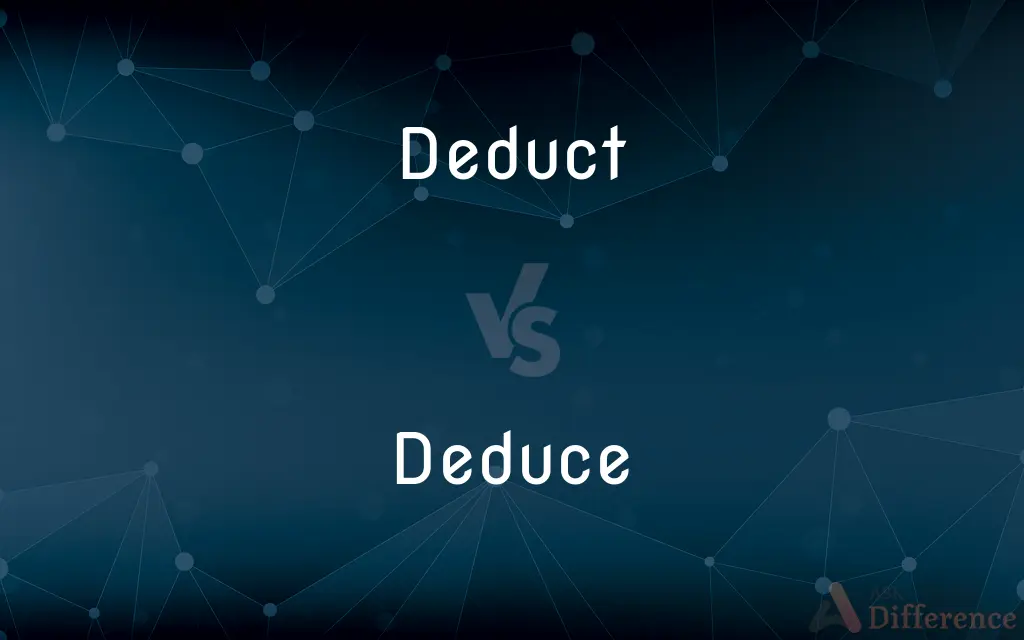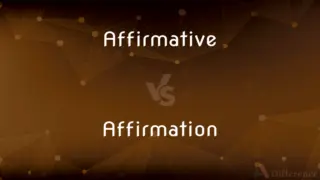Deduct vs. Deduce — What's the Difference?
By Fiza Rafique & Maham Liaqat — Updated on March 21, 2024
Deduct involves subtracting a certain amount from a total, mainly in financial contexts, while deduce is about arriving at a conclusion through reasoning from available evidence.

Difference Between Deduct and Deduce
Table of Contents
ADVERTISEMENT
Key Differences
Deduct is primarily used in contexts involving financial transactions or calculations, where a specific amount is subtracted from a total. For example, taxes are deducted from a salary. On the other hand, deduce is employed in reasoning and logic, referring to the process of reaching a conclusion based on the evidence and facts at hand.
In the realm of accounting and finances, to deduct means to take away a part of the whole, impacting the net sum directly. This action is tangible and directly affects monetary values. Whereas deducing involves abstract cognitive processes, leading to understanding or insights, which might not immediately alter physical states but can change perceptions or decisions.
Deduction as a term in finance or mathematics has a clear, quantitative end result—specific figures are removed from a larger amount. Conversely, deduction in logic or critical thinking results in qualitative insights, revealing new truths or understandings based on given premises.
When you deduct, the primary focus is on the arithmetic operation and its impact on numerical values. This is a straightforward, objective process. Deduce, however, involves inference and subjective judgment, where the conclusion isn't always universally agreed upon and depends on the interpretation of the available information.
In daily use, deduct often appears in practical, everyday financial decisions and transactions, highlighting its relevance in personal and business finance management. In contrast, deduce is more commonly found in academic, investigative, or intellectual discussions, emphasizing its role in developing arguments, theories, or solving puzzles.
ADVERTISEMENT
Comparison Chart
Primary Context
Financial transactions and calculations
Reasoning and logic
Nature
Quantitative, involving subtraction
Qualitative, involving inference
Outcome
Direct impact on numerical values
Insights or conclusions based on evidence
Usage
Common in accounting, finance, and everyday transactions
Common in academic, investigative, or intellectual discussions
Example
Deducting expenses from income to calculate net profit
Deducing a suspect’s motive from clues in an investigation
Compare with Definitions
Deduct
To take away a part or percentage.
Points were deducted for each mistake in the test.
Deduce
To draw a conclusion from known facts.
We can deduce the company's success from its increased revenue.
Deduct
To remove an amount before taxation.
The company deducts health insurance premiums from employee salaries.
Deduce
To infer something based on reasoning.
From the evidence, the detective deduced the identity of the culprit.
Deduct
To reduce the amount of taxable income.
You can deduct charitable donations from your taxable income.
Deduce
To arrive at a logical conclusion.
He deduced that it must have rained last night because the streets were wet.
Deduct
To subtract an amount from a total.
She deducted the discount from the total bill.
Deduce
To understand something by thinking about the known facts.
She deduced that he was lying from his inconsistent statements.
Deduct
To imply a subtraction in mathematical operations.
Deduct four from ten to get six.
Deduce
To solve problems using logical reasoning.
By deducing the pattern, she solved the puzzle quickly.
Deduct
Subtract or take away (an amount or part) from a total
Tax has been deducted from the payments
Deduce
To reach (a conclusion) by reasoning.
Deduct
To take away (a quantity) from another; subtract.
Deduce
To infer from a general principle; reason deductively
Deduced from the laws of physics that the new airplane would fly.
Deduct
To derive by deduction; deduce.
Deduce
To trace the origin or derivation of.
Deduct
To take away a desirable part
Poor plumbing deducts from the value of the house.
Deduce
(transitive) To reach (a conclusion) by applying rules of logic or other forms of reasoning to given premises or known facts.
Deduct
To take one thing from another; remove from; make smaller or less by some amount.
I will deduct the cost of the can of peas from the money I owe you.
The player was deducted a point for violent conduct.
Deduce
(transitive) To examine, explain, or record (something) in an orderly manner.
Deduct
To lead forth or out.
A people deducted out of the city of Philippos.
Deduce
To obtain (something) from some source; to derive.
Deduct
To take away, separate, or remove, in numbering, estimating, or calculating; to subtract; - often with from or out of.
Deduct what is but vanity, or dress.
Two and a half per cent should be deducted out of the pay of the foreign troops.
We deduct from the computation of our years that part of our time which is spent in . . . infancy.
Deduce
To be derived or obtained from some source.
Deduct
To reduce; to diminish.
Deduce
To take away (something); to deduct, to subtract (something).
To deduce a part from the whole
Deduct
Make a subtraction
Deduce
To lead (something) forth.
Deduct
Retain and refrain from disbursing; of payments;
My employer is withholding taxes
Deduce
To lead forth.
He should hither deduce a colony.
Deduct
Reason by deduction; establish by deduction
Deduce
To take away; to deduct; to subtract; as, to deduce a part from the whole.
Deduce
To derive or draw; to derive by logical process; to obtain or arrive at as the result of reasoning; to gather, as a truth or opinion, from what precedes or from premises; to infer; - with from or out of.
O goddess, say, shall I deduce my rhymesFrom the dire nation in its early times?
Reasoning is nothing but the faculty of deducing unknown truths from principles already known.
See what regard will be paid to the pedigree which deduces your descent from kings and conquerors.
Deduce
Reason by deduction; establish by deduction
Deduce
Conclude by reasoning; in logic
Common Curiosities
How do you use deduce in a sentence?
You use deduce to indicate deriving a conclusion from evidence or reasoning, e.g., "She deduced that they were lost based on their confusion."
Do deduct and deduce have the same root?
Yes, both come from Latin "ducere," meaning "to lead," but have diverged in meaning to refer to subtracting and reasoning, respectively.
How does technology impact deductive processes?
Technology, especially in data analysis and AI, can enhance deductive reasoning by providing more data and patterns for logical analysis.
Can deduct be used in a legal context?
Yes, it can refer to the subtraction of damages, costs, or other pecuniary matters in legal settlements.
Is deducing always accurate?
Deductions are based on reasoning from known facts; they can be highly accurate but are sometimes subject to interpretation and may vary with the available evidence.
What's a common mistake when deducing?
A common mistake is overlooking key evidence or making assumptions without sufficient basis.
How important is accuracy when deducting amounts?
Accuracy is crucial in financial contexts to ensure correct calculations, tax compliance, and budget management.
What does it mean to deduct something?
To deduct means to subtract a certain amount from a total, especially in financial contexts.
Are there tools to help with financial deductions?
Yes, numerous financial software and tools are designed to help calculate deductions, especially for taxes and budgeting.
Can you deduct anything other than money?
Typically, deduct refers to amounts or percentages, mainly monetary, but metaphorically it can refer to reducing anything quantifiable, like points or credits.
Can I deduct personal expenses for business?
Personal expenses generally cannot be deducted for business purposes unless they are directly related to business activities and justifiable.
How does culture influence deductive reasoning?
Cultural background can influence the approach to problem-solving and reasoning, affecting how information is interpreted and conclusions are drawn.
Is it possible to deduce without all the information?
Yes, deducing often involves making inferences with incomplete information, using logic and known facts to fill in gaps.
What are the limits of deduction in financial planning?
The main limits include regulatory constraints, the availability of deductions, and the specifics of individual or business financial situations.
Can deductive reasoning be taught?
Deductive reasoning skills can be developed through practice, education, and critical thinking exercises.
Share Your Discovery

Previous Comparison
Affirmative vs. Affirmation
Next Comparison
Clarinettist vs. ClarinetistAuthor Spotlight
Written by
Fiza RafiqueFiza Rafique is a skilled content writer at AskDifference.com, where she meticulously refines and enhances written pieces. Drawing from her vast editorial expertise, Fiza ensures clarity, accuracy, and precision in every article. Passionate about language, she continually seeks to elevate the quality of content for readers worldwide.
Co-written by
Maham Liaqat













































